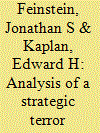| Srl | Item |
| 1 |
ID:
094736


|
|
|
|
|
| Publication |
2010.
|
| Summary/Abstract |
The authors model a terrorist organization's choice over the scale and planning horizon of terror attacks and the consequences for the organization's evolution. The organization can engage in short-term attacks planned and executed in a single period, characterized by a low fixed cost and relatively high marginal cost, and longer term attacks planned and executed over two periods, having a high fixed cost but relatively low marginal cost. Longer term attacks require more resources and cause more damage if successful. Successful attacks increase the organization's size; in addition, the organization has a natural growth rate. Attacks can fail because of failed execution or counterterror interdiction. In a two-period version of this model, the authors analyze the terror organization's attack decisions. They use simulations to characterize optimal strategies and explore their implications for the growth of the organization. The authors identify a set of strategic regimes, and the results show that they always occur in a fixed order as a function of the organization's initial strength.
|
|
|
|
|
|
|
|
|
|
|
|
|
|
|
|
| 2 |
ID:
120433


|
|
|
|
|
| Publication |
2013.
|
| Summary/Abstract |
An ongoing debate among policymakers and terrorism scholars concerns the effectiveness of deterrence as a counterterrorism tool. Absent from the debate is a discussion of the complex nature of terrorist decision making. Decisions are made at varying levels in a terrorist organization, often by actors having different motives, resulting in behavior that is not always fully rational. This article identifies several circumstances when terrorist behavior is not the product of an entirely unitary, rational decision-making process, and therefore highlights when deterrence policies will be least effective. It concludes with some policy implications for understanding when deterrence policies are most likely to succeed and how to address terrorism in other situations.
|
|
|
|
|
|
|
|
|
|
|
|
|
|
|
|
| 3 |
ID:
172497


|
|
|
|
|
| Summary/Abstract |
Terrorists from a wide array of ideological influences and organizational structures consider security and risk on a continuous and rational basis. The rationality of terrorism has been long noted of course but studies tended to focus on organizational reasoning behind the strategic turn toward violence. A more recent shift within the literature has examined rational behaviors that underpin the actual tactical commission of a terrorist offense. This article is interested in answering the following questions: What does the cost–benefit decision look like on a single operation? What does the planning process look like? How do terrorists choose between discrete targets? What emotions are felt during the planning and operational phases? What environmental cues are utilized in the decision-making process? Fortunately, much insight is available from the wider criminological literature where studies often provide offender-oriented accounts of the crime commission process. We hypothesize similar factors take place in terrorist decision making and search for evidence within a body of terrorist autobiographies.
|
|
|
|
|
|
|
|
|
|
|
|
|
|
|
|